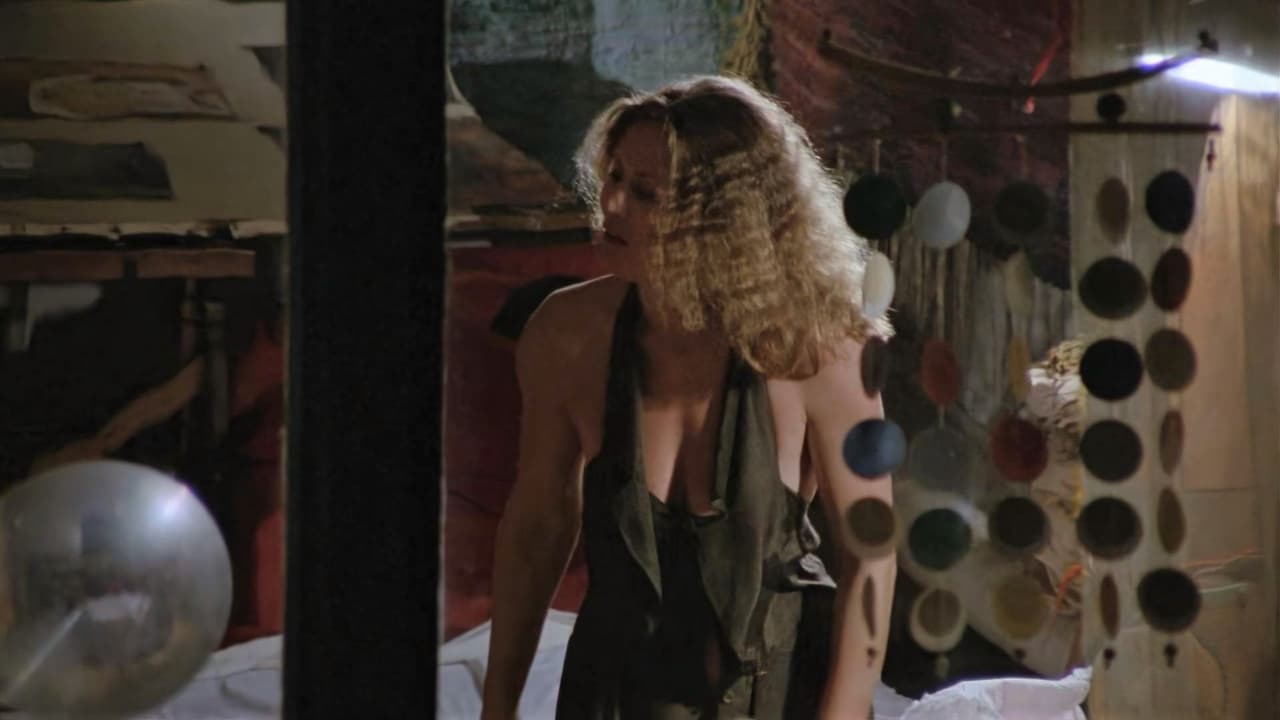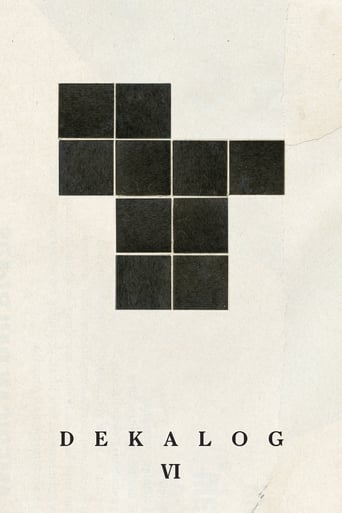

Episode 6 of 'Dekalog' is very strongly indebted to Hitchcock's 'Rear Window (1954).' For the past year, young Tomek (Olaf Lubaszenko) has been spying on the life of his older neighbour, the promiscuous Magda (Grazyna Szapolowska). When he finally finds the courage to approach Magda in the flesh, she is amused by his awkward advances, and decides to toy with his adolescent emotions. Her rejection ultimately leads Tomek to attempt suicide, in a heartbreaking scene that forces the viewer to wait an eternity before the bathwater begins to stain red.In Hitchcock's film, the viewer was basically confined to James Stewart's cramped apartment. Kieslowski, on the other hand, adroitly shifts the viewer's perspective as the story matures. In the opening scene, the focus is on Magda, whom we presume is the main character, and I mentally brushed aside the post-office clerk as an insignificant bit- part. Instead, the film follows Tomek, and our glimpses of Magda are for a long time restricted to distant glimpses across an apartment courtyard, silent but titillating in their voyeurism. By the end of the film, the roles have been entirely reversed; Magda begins to obsessively scan Tomek's bedroom with her binoculars.Kieslowski had previously released this episode in a feature-length version under the title 'A Short Film About Love (1988).' I haven't seen this film – nor, indeed, have I seen any of the director's work outside the mini-series – but I'd love to see how he expands upon the relationship between Tomek and Magda. This particular episode falls under the commandment "Thou shalt not commit adultery," though perhaps something about coveting thy neighbour's wife would've been more appropriate. I'm not particularly phased, though; Kieslowki is constantly blurring the lines between the commandments.
... View MoreIn most of the films the treatment of love leaves a lot to be desired. This might be because it is always a challenge to effectively portray true feelings of love which might appeal to all kinds of viewers. This is the reason why an occult theme such as love should always be shown by taking into consideration concomitant themes such as desire, lust,sexuality and voyeurism.These sentiments are some of love's near cousins.This can help in making love stand apart from other secondary feelings."Dekalog:Dekalog,Szesc (#1.6)" is an excellent short film which gives us an idea about true love.Polish director Krzysztof Kieslowski shows us how true love comes and makes sense in the life of a person for whom love means nothing.The puzzling thing is that this is a case of an unusual love story involving a young boy and a woman who is older than her.This theme might appear as a bit hackneyed due to the fact that a lot of elements have been copied from American cinema but nevertheless the overall content of the film is original.A great film for all those who believe that love can only be felt and cannot be shown.
... View MoreOnce again Kieslowski manages to produce a compelling and thought provoking film. This time seemingly constructing his plot from the best parts of "Rear Window" and "Lolita". Kieslowski presents his characters simply as they are, free of prologues, backgrounds, flashbacks or exposition and does not "ask" us to identify with the obsessive voyeur or the subject of his gaze but "presents" them to us as subjects to observe. Inevitably Kieslowski's choices pay off as we begin to empathize with these characters not necessarily because he wants us to but because they're needs and desires are too similar to ours for us to simply look at them in disgust. Episode 6 presents us with two characters who begin on opposite sides of the emotional spectrum and end up reversed just as their voyeuristic tendencies do. There is never any chastising from one character to another which some have called unrealistic or contrived. For me however this rings truer than the most moralizing of speeches because both characters know they're in no position to judge the other. They're both aware of their faults and willingly pay for them (witness Magda's indifference to her own suffering and Tomek's voluntary repentance courtesy of Magda's lover (ala "Raging Bull"). To those who would call such a tale unrealistic I say go watch "Pretty Woman" again.
... View MoreCat-and-mouse game of voyeur and victim, with an exchange of roles between the two about halfway through. Seems to have been well-received by the critics, but I found it too coy and contrived, not to mention compromised by a lack of credibility: The supposedly naive pure idealistic love of the voyeur, a 19 year-old boy, fails to acknowledge the inherent ugliness of voyeurism. Voyeurism entails a sinister imbalance of power between watcher and watched; it consists of cruelty and exploitation more than love; all of which the woman seemed to overlook much too easily. If the boy truly loved her, he would have stopped stalking her; his isn't love, but disease. The whole affair is intellectual structuralism at its worst, a plot concocted to demonstrate a point. Apparently, the woman spied upon "adulterates" the boy's love by humiliating him, as well as being unfaithful to her lover and unfaithful to love itself by her cynicism (thus violating the commandment, though unmarried). Her repentance and reversal seems as sudden and arbitrary as everything else in the film. Silly color coding abounds; the stranger in white (angel of death?) here carries a suitcase and shopping bag. The only intriguing element for me was the surrogate mother's sexual possessiveness, a tickle of evil.
... View More